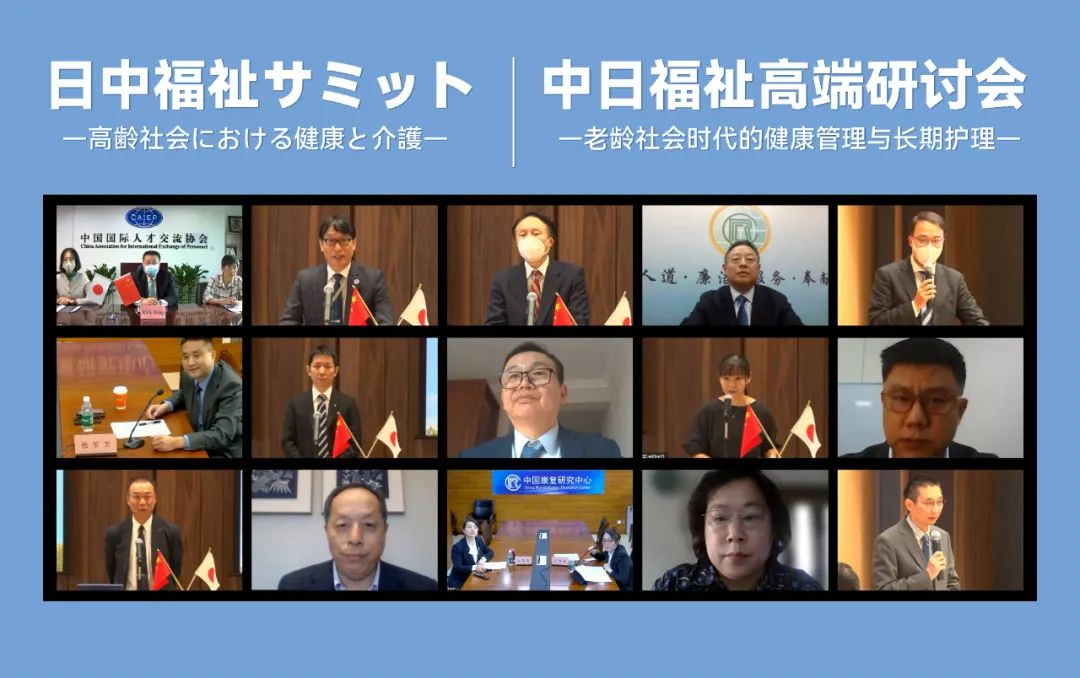China-Japan High-end Seminar on Welfare Successfully Held

On November 16, China-Japan High-end Seminar on Welfare was successfully held online. Themed at “Health Management and Long-term Care in an Aging Society”, the Seminar was cosponsored by the Office of China Association for International Exchange of Personnel in Japan, Josai University, and Josai International University and organized by Shenzhen Center for International Exchange of Personnel and Japan-China Exchange Promotion Association. President Kenji Sugibayashi of Josai International University, Qin Weidong, Counsellor for Scientific and Technological Affairs of Chinese Embassy in Japan, Deputy Director Xia Bing of China Association for International Exchange of Personnel, and Director Wu Shicai of China Rehabilitation Research Center addressed the Seminar.
This year is the 50th anniversary of the normalization of relations between China and Japan, for which leaders of the two countries congratulated each other. Chairman Xi Jinping emphasized in his message that he would like the two countries to jointly establish a relationship catering to the new era. The 20th National Congress of the Communist Party of China made important deployments centered on improving people’s well-being and quality of life and proposed the Healthy China Initiative, for which we should implement active national strategies responding to the aging of population and develop old-age care and pension industries.
Counsellor Qin Weidong propagated the spirit of the 20th National Congress in his speech and mentioned that Chinese government has built up the largest medical and health system in the world while thoroughly implementing the people-centered development idea. As a developing country with a large population, China is still facing lots of challenges in coping with population aging and the development of social welfare. As the country with the highest population aging degree in the world, Japan has relatively complete welfare-related system, industries, talents, technology, and policy environment that guarantees the employment of the aging population. So, this Seminar created a very good platform for the two countries’ communication on the welfare field.
Deputy Director Xia Bing said in his speech that aging problem has become a common topic in current development of human society, and that the research and exchange between Chinese and Japanese experts in relevant fields are significant to promoting the cooperation and development of the two countries’ old-age care industry. China Association for International Exchange of Personnel would like to work with relevant Japanese institutions to carry forward practical cooperation, expand the cooperation fields, innovate in cooperation modes, and improve the cooperation level, so as to make new contributions to promoting bilateral sci-tech cooperation, talent exchange, and peace and friendship between the two countries.
Director Wu Shicai mentioned in the video address that with the progress of population aging in China, there has been greater demand for rehabilitation from senile diseases. Rehabilitation, as a pivot between acute treatment, old-age care and nursing, has been playing a more and more important role. According to him, China Rehabilitation Research Center, as the birthplace of modern rehabilitation in China, is a large-scale modern comprehensive rehabilitation institution that integrates rehabilitation, education, scientific research, engineering, information, and social service, which plays a crucial role in promoting the high-quality development of China’s rehabilitation industry. He hoped that Chinese and Japanese experts could have profound exchange and learn from each other in coping with population aging so as to jointly promote the high-quality development of health and welfare industries in both countries.
Kenji Sugibayashi said in his speech that it is very meaningful to have experts from both countries to communicate on topics like aging, medical welfare, and rehabilitation nutrition right upon the 50th anniversary of the normalization of relations between China and Japan. According to him, Josai University has been in favorable partnerships with Chinese universities since 1986. He expressed his will of making joint efforts with China for the communication on aging problems and he would like to contribute to a better relationship between the two countries as a friendly contact.
Eleven experts from relevant industry-university-research fields of both countries had heated discussions on topics about health management and long-term care in an aging society and relevant prospects. Their topics covered a number of aspects, such as medical welfare policies, the future of medical products and pharmaceutic preparations, rehabilitation of musculoskeletal disorders and sports, the realization of a healthy aging society, the development of transdermal patches and oral fast dissolving films, DX promotion in care and welfare industries, long-term care from the perspective of bath help service, improving long-term care with rehabilitation therapy, forest rehabilitation, home care and health management of disabled old people, and long-term care insurance system.
The opening ceremony was presided over by Chief Representative Kuang Mahua of the Office of China Association for International Exchange of Personnel in Japan, and the expert speeches by Prof. Yu Yang, Vice President of Josai University.